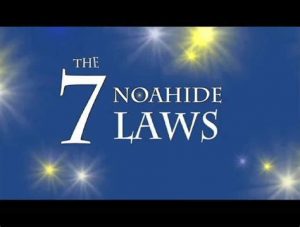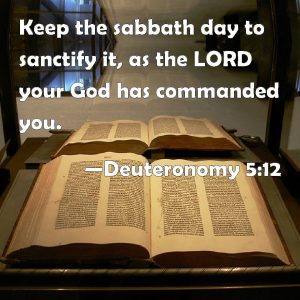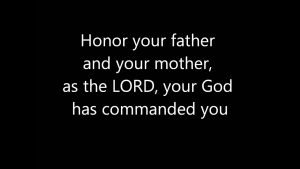Bishalach 2021 – Testing, Testing 1, 2, 3
by devadmin | January 29, 2021 2:07 am
 Testing, Testing 1,2,3:
Testing, Testing 1,2,3:
Everyone avada knows that following Exodus from Egypt, the Yiddin trekked through the midbar until they arrived under Har Sinai where three days later the RBSO in a display of thunder and lightning, personally came down and delivered the Aseres Hadibrois (The Ten Commandments). We’ve read the heylige Toirah where these events are described vividly and colorfully. We shall revisit them in next week’s parsha. As well, we’ve all seen the movie. We picture ourselves as having been there; in fact, we’re taught -in the medrish of course- that all souls, to include ours, were there in attendance for the momentous occasion. It was Revelation and the wedding -so to speak- between the Yiddin and the RBSO. It was big! And the RBSO was there to unveil the newly minted Ten Commandments.
Of course, there is a machloikes (dispute) if He delivered all 10 by Himself, or, if the Yiddin having fainted (according to others, even died before being brought back to life) were so petrified that Moishe was called in to take over and complete the transmission of the commandments. That argument for another day. And avada we are familiar with the ‘cheyt ho’eygel (sin of the golden calf) which led Moishe to shatter the first set he came down with and how the RBSO minted a second set of Ten Commandments for Moishe to descend the mountain with. That too for another day. Ober, the opening question for today is azoy: aside from the sequel to the Ten Commandments, was there a prequel? Were there commandments before the ten?
 According to Dictionary.com and other informed sources, a prequel can be defined as a work (such as a novel or a play) whose story precedes that of an earlier work. According to Wikipedia, a widely read latter day exegete, the very first prequel was the movie Star Wars, ober is that emes? According to another source (the heylige internet), the first prequel was the movie Another Part of the Forest (1948), which told the precursor story to The Little Foxes (1941). Which was it, ver veyst? Avada the heylige Toirah is neither a novel, a play, or a movie, but could it be that the RBSO introduced the first ever prequel commandments a month or so before revelation back in the year 2448, over 3300 years ago?
According to Dictionary.com and other informed sources, a prequel can be defined as a work (such as a novel or a play) whose story precedes that of an earlier work. According to Wikipedia, a widely read latter day exegete, the very first prequel was the movie Star Wars, ober is that emes? According to another source (the heylige internet), the first prequel was the movie Another Part of the Forest (1948), which told the precursor story to The Little Foxes (1941). Which was it, ver veyst? Avada the heylige Toirah is neither a novel, a play, or a movie, but could it be that the RBSO introduced the first ever prequel commandments a month or so before revelation back in the year 2448, over 3300 years ago?
Today we shall delve into another topic: what happened when the Yiddin -on their way to Mt Sinai- reached a place called Marah? Nu, the heylige Toirah does specifically tell us that they arrived, that they were thirsty, that they tried drinking the water, that it was bitter, that the RBSO showed Moishe a piece of wood or a piece of a tree, that Moishe threw it into the water and that the waters than became sweet. But wait! The heylige Toirah does also complete this event by telling us ‘one more thing’ and it is that one more thing we shall be discussing. What is that one more thing?
It is avada emes that the Yiddin received and were commanded in the first Ten Commandments at Mt. Sinai. Do all agree? Not very clear. Let’s try again: is it at all shayich (plausible) that at least a few of the commandments were not so new? Say what? Is it possible that the Yiddin were already familiar with a few of the ten? Does the heylige Gemora suggest that there was efsher a pre-Sinai category of mitzvis? Nu, believe it or not, there is a school of thought brought down in the heylige Gemora and elsewhere, which suggests that the Yiddin had received either a few, or even a full set of commandments before they ever arrived to Mt. Saini and zicher before Revelation. How can that be? We shall explore this question as we review Parshas Beshalach which is chock full of so many interesting topics to include kriyas yam suf (splitting of the sea), mana from heaven and much more.
Ober the first question is azoy: does the heylige Toirah tell us about mitzvis given pre Matan Toirah? Is there mention of any one, or more, specific commandments before Revelation? And the answer is not! Ober, not so fast because there are these few -five to be exact- words in this week’s parsha of Beshalach where the main focus otherwise is on the splitting of the sea, Moishe striking up the choir, Miriam and the girls singing harmony, if not their own song, and so much more. But the five words cry out for further elucidation. And to find out about the five words, we shall skip over all other hot topics. We need to chap why Rashi, the heylige Gemora and others tell us with a degree of certitude that the Yiddin were efsher commanded in commandments before Revelation. How many? Some say as many as ten. Mamish? And if that’s the case, why weren’t those referred to as the Ten Commandments? Weren’t they the real first Ten? Do those -efsher given earlier- command no respect?
The question is azoy: why would Rashi, the heylige Gemora, and other sages, all suggest that the Yiddin were already recipients of a set of commandments? Shoin, let’s find out. And the answer is azoy: The one posik driving this entire controversy is found in Shmois 15:25 and revolves around five words in a verse which discusses a different topic altogether. What words? “Shom som loi chok u’mishpot.” Shoin. When words appear to be a shtikel disjoined to the others in the same posik, of course our sages of yore went to town trying to connect the dots. Without knowing more, one might think they refer to a difficult to pronounce Chinese dish, ober what taka do these five words mean? Literally translated, they mean “there He gave them a law and an order.” Avada we know that He did not give them Chinese, nor the script of the pilot for ‘Law and Order,’ ober what then were they given? Shoin, let’s first set the scene by reading the few pisukim referenced above in their entirety.
“So Moishe brought Israel from the Red Sea, and they went out into the wilderness of Shur. And they went three days in the wilderness, and found no water. And when they came to Marah, they could not drink of the waters of Marah for they were bitter, therefore, its name was called Marah. And the people murmured against Moishe, saying, “What shall we drink?” And he cried to the Lord, and the Lord showed him a tree, which he threw into the waters and made the waters sweet. There he made for them a statute and an ordinance (law and order), and there He tested them, and said, “If you will diligently listen to the voice of the Lord your God, and will do that which is right in His sight, and will give ear to his commandments, and keep all his statutes, I will put none of these diseases upon you, which I have brought upon the Egyptians; for I am the Lord that heals you.” In plain English: do the right thing and the RBSO has your back.
 The RBSO gave them a statute and an ordinance? Let’s chazir: After the momentous Exodus and the spectacular splitting of the Red Sea the Yiddin find themselves at Marah. The situation seems like a question of insufficient supplies; they are a thirsty people having traveled three days in a dry midbar without water. They are in need of an efficient water source. Ober, the end of the text seems epes more than a shtikel perplexing: “There He made a statute and an ordinance.” In plain English: there He laid down the law! What’s pshat? Ober which law or laws? And if laws were given, what are they? Are they specifically delineated? Not! Is there a hint as to what these laws might have been? Also not! How then are we to ascertain that laws and judgments were handed down at this place called MARAH? And if they were, which one’s please? And for that Raboyseyee, we need to look at Rashi, the heylige Gemora and other sources to piece together this puzzle.
The RBSO gave them a statute and an ordinance? Let’s chazir: After the momentous Exodus and the spectacular splitting of the Red Sea the Yiddin find themselves at Marah. The situation seems like a question of insufficient supplies; they are a thirsty people having traveled three days in a dry midbar without water. They are in need of an efficient water source. Ober, the end of the text seems epes more than a shtikel perplexing: “There He made a statute and an ordinance.” In plain English: there He laid down the law! What’s pshat? Ober which law or laws? And if laws were given, what are they? Are they specifically delineated? Not! Is there a hint as to what these laws might have been? Also not! How then are we to ascertain that laws and judgments were handed down at this place called MARAH? And if they were, which one’s please? And for that Raboyseyee, we need to look at Rashi, the heylige Gemora and other sources to piece together this puzzle.
 Says Rashi who knew or figured everything out, azoy: In Marah, He gave them some sections of the Toirah: Shabbis observance, the no-questions-asked law of the Poro Aduma (red heifer), and the laws of jurisprudence. Not working on the Shabbis is one, the law of the red cow – the way in which one can be purified from a severe ritual impurity during the days when the Temple stood is another; and laws – the establishment of a legal system that will enact laws and allow for a proper society – was the third. Shoin, they got three? Why these and why were they given?
Says Rashi who knew or figured everything out, azoy: In Marah, He gave them some sections of the Toirah: Shabbis observance, the no-questions-asked law of the Poro Aduma (red heifer), and the laws of jurisprudence. Not working on the Shabbis is one, the law of the red cow – the way in which one can be purified from a severe ritual impurity during the days when the Temple stood is another; and laws – the establishment of a legal system that will enact laws and allow for a proper society – was the third. Shoin, they got three? Why these and why were they given?
And for some more confusion, elsewhere, Rashi lists honoring parents as having been commanded at Marah as well and that would make four mitzvis revealed before Revelation. In Parshas Mishpotim (Shmois 24:3) Rashi writes azoy: the seven Noachide laws, shabbis observance, honoring parents, red heifer, and [social] laws which were given at Marah. How do we reconcile the two Rashis? Ver veyst? Why, did Rashi add the poroh adumah to the commandments given at Marah? And why did he omit the commandment to honor parents in this week’s parsha? Of-course Rashi was a genius and recognized that if the RBSO gave the Yiddin a “chok” (a law without explanation; just do it because I said so) at Marah, that it must be referring to the laws of the poroh adumah (red heifer) which is the archetypal chok. Ober, why did Rashi include shabbis observance? Because Rashi learned the entire heylige Toirah and came across these words (Shmois 16:23), also in our parsha: “This is what the Lord had spoken about — tomorrow is the day of rest, the Holy Shabbis to the Lord.” Ober, is there any discussion before these words about shabbis observance? Not! Prior to this verse, we do not find any discussion of shabbis in the Toirah other than the general comments back in Bereishis. Nonetheless, the text makes clear reference to some type of earlier discussion centering around the shabbis. What’s pshat? Rashi chapped that if these words appear, shabbis observance must have been introduced earlier. Ober where? At Marah! Shoin and settled.

Says the heylige Gemora (Sanhedrin 56b), azoy: the specific Commandments of respecting parents, observing the heylige shabbis, the mitzvah of the Poro Adumah (Red Heifer), and the need for civil law were all given to the Yiddin at Marah in order to acquaint them with Jewish Toirah law, and to see whether or not they would embrace these laws joyfully and with enthusiasm. Wait: how many were just enumerated? To me, there appear to be four. In plain English: these laws were introduced -in some form of a dress rehearsal, or perhaps even a test- to see if the Yiddin were ready for prime time. Ober, still the question is azoy: when or how were they introduced absent text describing such introduction of the laws themselves? Were the Yiddin supposed to guess that these specific laws are to be observed? And if they were but a dress rehearsal, or a trial balloon so to speak- were the Yiddin then mamish obligated to follow these new laws?
 Says the RambaN very empathically azoy: these laws did not become obligatory at this point, but were instead only intended for reflection and optional observance, in the manner that our forefathers were supposed to have observed Mitzvis.
Says the RambaN very empathically azoy: these laws did not become obligatory at this point, but were instead only intended for reflection and optional observance, in the manner that our forefathers were supposed to have observed Mitzvis.
Says the heylige Gemora (Sanhedrin 56b) veyter, azoy: the Yiddin were given ten precepts at Marah, seven of which had already been accepted by the children of Noiach, to which were added at Marah, social laws, the Shabbis, and honoring one’s parents. Again we ask, where is this written? And we know this how? What proof does the Gemora have that this is in fact what went down at Marah besides a piece of bark which Moishe threw into the bitter waters? Ober Raboyseyee, you cannot outwit the heylige Gemora because its codifiers too were geniuses and they figured it all out. The logic of the heylige Gemora is clear: The Ten Commandments as you all know, or should, are found twice in the heylige Toirah. Once in next week’s Parsha of Yisroy and one again in Vo’eschanan. Why were they repeated? That topic too for another day, ober, a few words in the second iteration caught the eye of the heylige Gemora, who, when reading the commandment to obey one’s parents found extra words. Again we’re back with extra words? What extra words? The words telling us “as you were commanded.” Commanded where? Pshat is azoy: since the second set of Ten Commandments came with “as the Lord thy God commanded you” attached to the commandment of honoring one’s parents, the Gemora figured out that the Yiddin had taka been so previously commanded. They were? Where? Shoin: they decided that the heylige Toirah was not harking back to Parshas Yisroy (where the Ten Commandments were introduced) but even further back to the time the Yiddin were encamped over at Marah. And now it all makes sense. And what about the heylige shabbis and its observance? So happens that there too these same words appear: “”as the Lord thy God commanded you.” Let’s read the words innaveynig where in Devorim 5:12 and 16 we read azoy: “Keep the Shabbis day to sanctify it, as the Almighty your God has commanded you.” “Honor your father and your mother, as the Almighty your God has commanded you.” The bottom line: only two of the Ten Commandments came with the reminder that the Yiddin had previously become obligated, or at least knowledgeable in them. They are the observance of shabbis and honoring one’s parents.

Ober, the next kasha is azoy: what was the purpose of the experience at Marah? And the answer Raboyseyee is azoy: it was at Marah where the RBSO began testing the Yiddin to see if they were ready to marry Him. It was there at Marah where He gave them test #1, the first of many- to see if the Yiddin were ready, or could get ready. If they had potential to be decent partners in marriage. Shoin, like most marriages, the relationship has been on the rocks for over 3300 years. And like most marriages -ad hayoim hazeh- for reasons which remain inexplicable, somehow it survived. Why? Ver veyst. Ober weren’t the Yiddin bad? Didn’t they cheat on Him almost immediately with the golden calf? They did! And didn’t they complain bitterly over and again about everything? Avada the RBSO chaps that we have been cheating on Him in so many different ways, ober, He seems to have endless patience, keeps giving us additional time and likely underserved lifelines. Why? Ver veyst? Are we the best of the worst? Or, is He -as are most wives- already used to our mishigas? Likely. And for that reason, Raboyseyee, many marriages just sail along even in troubled waters. Why? It’s typically about the kinder (the children); we are His children and shoin. Let’s get back to Marah where Moishe cried unto the RBSO and where He answered with sweet waters and a few unnamed commandments.
Ober why test us? Didn’t He already decide to redeem us from slavery and march us to Har Saini to get married and receive the heylige Toirah? And the answer Raboyseyee is azoy: testing has always the RBSO’s style and modus operandi. He tested Avrohom; did He ever! Tested Yitzchok and Yaakov and so on. Seemingly tests make us better people. We study for them and thereby increase our knowledge. Of course, we also cheat on them, ober that for another day. Testing, seemingly helps develop the person, deepening his commitment, and building his character. Says the heylige Zoihar: at Marah the Yiddin underwent a process which would cleanse them from the Egyptian exile and prepare them for the Revelation at Sinai.
Says the Ramban (commentary on the akeidas Yitzchok (Bereishis 22:1), azoy: Being omniscient, the RBSO knows whether or not we are capable of “passing” the test. Ober, if that’s the case and zicher it is, if we are capable mamish, what is gained by our going through the process? If we are not capable, would testing us not be an injustice? Ober says the Ramban that the “nisayon” (test) is an act of kindness by the RBSO, directed only at someone who will be able to pass and designed to give him the opportunity to “bring the potential into the actual.” Someone but willing to sacrifice his son to God does not receive as much reward as one who mamish sets out on the road to do so. In other words: testing is good. Says the Seforno: the very act of bringing the potential into the actual raises the level of the person’s potential. It helps develop the person, deepening his commitment and building his character. It is primarily this second reason that lies behind the RBSO’s test of the Yiddin at Marah. Receiving “chok u-mishpat” (earlier commandments) at this stage served to build the character of the Yiddin, preparing them for to receive the heylige Toirah. Of course, such character rebuilding did not prevent the Yiddin from partying hearty with the eygel but weeks later, nor did it prevent their many other foibles. That being said, the RBSO must love us dearly; thankfully, His patience knows no bounds.
A gittin Shabbis,
The Heylige Oisvorfer Ruv
Yitz Grossman
Source URL: https://oisvorfer.com/bishalach-2021-testing-testing-1-2-3/